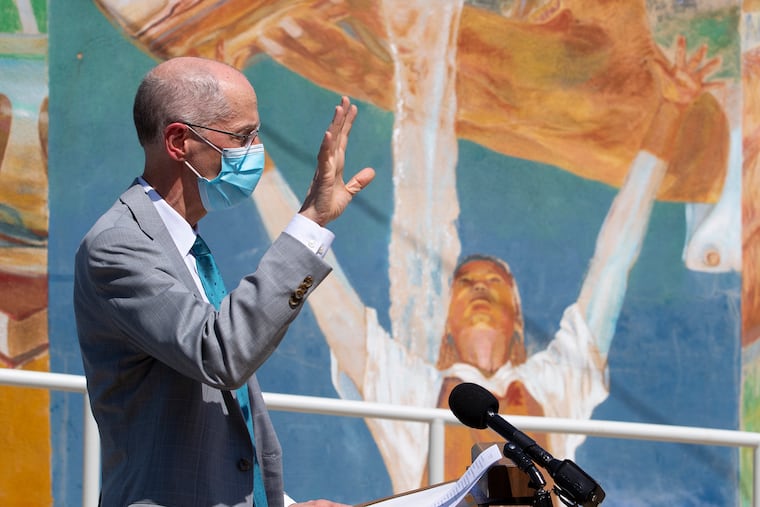Philly boosts coronavirus testing access for city residents who need it most
The city is aiming to reach a goal of 5,000 COVID-19 tests a day.

Philadelphia is testing about 1,700 people a day for COVID-19, but getting ahead of the virus will take more like 5,000 tests a day, said Health Commissioner Thomas Farley on Tuesday.
The city took a step toward that goal with a new testing center at Berks and 20th Streets in North Philadelphia, which had its official opening Tuesday. It’s designed to improve access for African American and low-income residents. For a variety of reasons, both groups are at higher risk for COVID-19′s worst effects.
“It’s one of many neighborhoods in the city with those characteristics,” Farley said. “We need to have increased access.”
The testing center is in the 19121 zip code, which has Philadelphia’s second-lowest median household income, according to city data, and has reported 391 positive COVID-19 tests and 15 deaths as of Tuesday.
Philadelphia’s health centers, established 50 years ago, have become an especially vital resource as pandemic-driven unemployment has cost many workers their health insurance.
The city’s eight health centers “are the safety net for Philadelphia,” said Tanya Malone, a physician at the Strawberry Mansion Health Center. The centers offer the equivalent of family practitioner care to residents, many of whom rely on Medicaid and Medicare.
The way the centers operate has changed radically in the last two months, and the changes may outlast the coronavirus.
» READ MORE: Pennsylvania is combining results of different coronavirus tests. That could be a big problem.
“We’re finding that a lot of that care can be handled by phone,” said Thomas Storey, director of ambulatory health-care services for the city health department. “When COVID is said and done and we move beyond COVID, the way ambulatory care is provided in this country will have shifted.”
Up to 75% of patient visits are now being handled by telephone, he said. The centers have not yet established video conferencing for patients, though that is in the works.
“We talk about how they’re feeling and their medications and come up with a plan,” Storey said. “Do it all over the phone.”
People with hypertension can usually tell a doctor everything needed as long as they have a blood pressure cuff at home, Storey said. Diabetes patients, though, can be harder to treat without in-person testing.
Thanks to COVID-19, crowded waiting rooms are no more. When a patient has to visit a center, they are met at the door by a staffer, given a mask if needed, and escorted directly to an examination room, Storey said.
“The image of the average outpatient practice where people come in, sit in the waiting room, wait for doctors to call them … ,” Storey said. “We’ve really made a concerted effort to avoid that.”
Those in-person visits can be tense for physician and patient, Malone said.
“Anxiety-filled,” she said. “Everyone, especially patients, we all fear the unknown, so we just try to do our best to do social distancing, make sure we wash our hands.”
Out of the 500 to 600 workers at the city’s health centers, eight have tested positive for COVID-19. All have recovered.
Malone remembered the first time one of her patients tested positive for the virus: “It was like, wow, it’s here,” she said.
All told, the eight health centers have had 1,100 patients test positive for the virus, the city reported. At Malone’s center in Strawberry Mansion, she said there have been more positive than negative test results — likely because in poor neighborhoods, people live in more cramped quarters.
“I attribute that to not being able to do social distancing properly. Even if someone is positive in the household, and you have a family of six and you only have three bedrooms," she said, "It’s kind of difficult to socially isolate.”
» READ MORE: High-income Philadelphians getting tested for coronavirus at far higher rates than low-income residents
The site that opened Tuesday will have a separate entrance for patients seeking COVID-19 tests, and results should be available in about a day, Farley said. Tests can be obtained by calling 215-685-2933 for an appointment. The patient will get a mask and gloves when arriving, and will be told how to self-isolate before leaving. A full list of testing sites are available at phila.gov/testing.
With cases and deaths trending downward, the indicators in Philadelphia show the city overcoming the initial wave of the coronavirus, Farley said. Much more testing and contact tracing, he said, are essential adjuncts to social distancing, especially in protecting vulnerable populations.
“If you don’t do what we need to do,” said City Council President Darrell L. Clarke at the opening of the new testing site, “it can go in the other direction.”
Staff writer Frank Kummer contributed to this article.